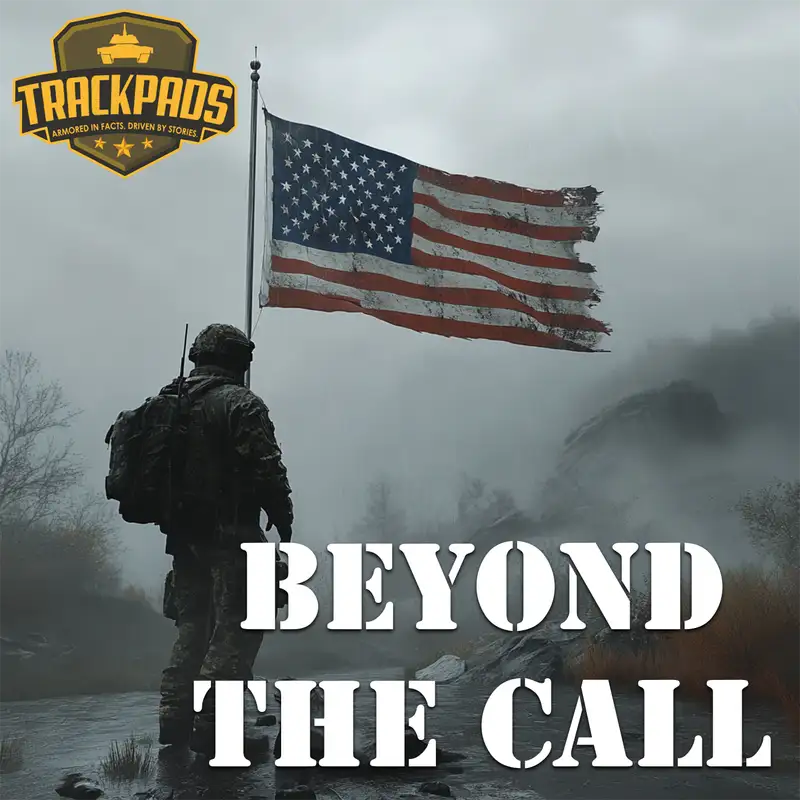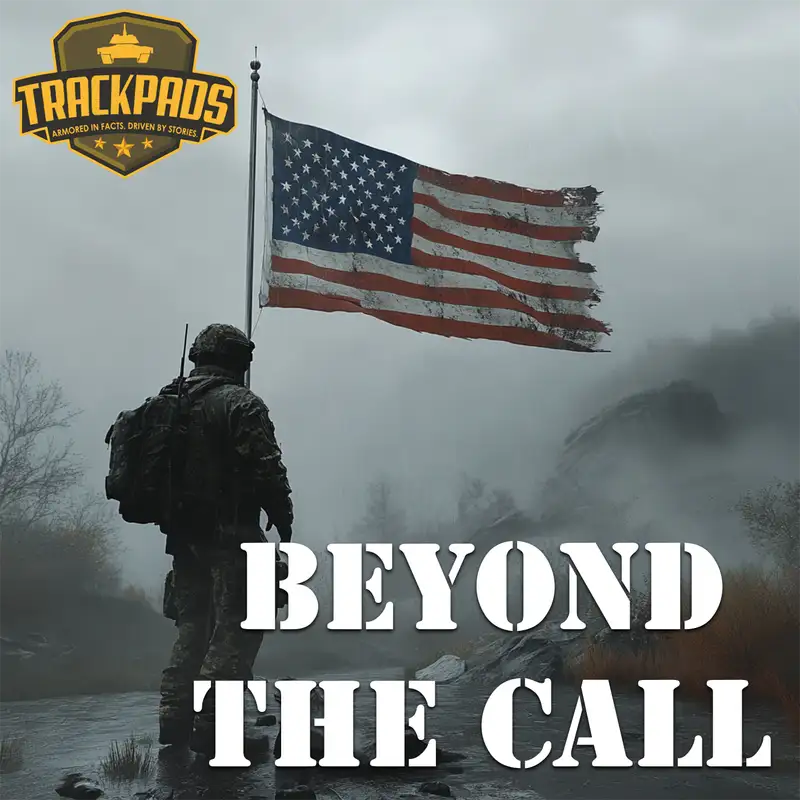The Heroism of William David Morgan
Welcome to Beyond the Call, where history, leadership, and heroism come alive.
Today’s episode explores the story of Corporal William David Morgan, a powerful story of courage and perseverance.
If you enjoy learning more about military history and extraordinary individuals, be sure to visit Trackpads dot com for articles, podcasts, and more.
Introduction
William David Morgan, a young Marine Corporal from Pittsburgh, Pennsylvania, exemplified bravery and selflessness on the battlefields of Vietnam, actions that earned him the Medal of Honor posthumously.
On February twenty-fifth, nineteen sixty-nine, during Operation Dewey Canyon, Morgan led his squad under relentless enemy fire southeast of Vandegrift Combat Base in Quang Tri Province, displaying courage beyond the call of duty.
His fearless leadership and personal sacrifice ensured the survival of fellow Marines, marking his name indelibly into the history of American military valor.
Amid the dense jungle terrain and lethal barrage of enemy fire, Morgan unhesitatingly charged forward, diverting enemy attention to save wounded comrades.
Fully aware of the mortal risks, he shouted encouragement to his team as bullets and grenades filled the air around him.
In a dramatic final act, he willingly exposed himself, drawing hostile fire and sacrificing his life to ensure his squad could regroup and defeat the enemy position, a moment of ultimate courage and sacrifice that vividly captures the essence of the Medal of Honor spirit.
Historical Context
The Vietnam War, fought from nineteen fifty-five to nineteen seventy-five, was a lengthy and highly controversial conflict characterized by intense guerrilla warfare, dense jungles, and challenging terrain.
Initiated as a struggle between the communist-backed North Vietnam and the United States-supported South Vietnam, it escalated into a broader Cold War confrontation, drawing in major international powers.
American involvement increased dramatically through the nineteen sixties, with United States forces deployed to prevent the spread of communism under the domino theory.
By the late nineteen sixties, public opinion in the United States had become deeply divided, leading to widespread anti-war protests and significant social upheaval.
The battle in which Corporal Morgan distinguished himself, Operation Dewey Canyon, took place from January twenty-second to March eighteenth, nineteen sixty-nine.
It was the last major offensive by the United States Marine Corps during the Vietnam War, aimed at disrupting the North Vietnamese Army's logistical supply routes and neutralizing their military capabilities in the mountainous border region.
Conducted in the remote and densely forested A Shau Valley near the border with Laos, the operation presented extreme logistical and tactical challenges.
Marines faced fierce opposition from well-entrenched North Vietnamese forces familiar with the difficult terrain and highly motivated to repel United States advances.
Operation Dewey Canyon was strategically significant due to its proximity to the Ho Chi Minh Trail, a complex logistical network used by the North Vietnamese Army to transport personnel, weapons, and supplies.
This extensive trail system extended from North Vietnam, through Laos and Cambodia, down into South Vietnam, and was pivotal for sustaining communist operations in the south.
Disrupting this critical supply line was essential for United States military objectives to weaken enemy forces and disrupt their operational capabilities.
Despite the challenging geography and fortified enemy positions, United States Marines conducted aggressive patrols and direct assaults aimed at limiting enemy effectiveness.
Corporal Morgan's unit, Company H, Second Battalion, Ninth Marines, Third Marine Division, played a vital role in the operation, engaging in intense combat against entrenched enemy forces.
The Ninth Marines were tasked with offensive operations, including reconnaissance, securing key terrain, and disrupting enemy supply routes.
These Marines faced a daunting task in navigating rugged mountains, dense jungles, and hostile engagements at close quarters.
Equipped with standard infantry weapons and supported by artillery and air assets, the unit endured severe hardships while continually pressing forward under enemy fire.
The geopolitical implications of battles like Operation Dewey Canyon resonated far beyond the battlefield.
While militarily successful in disrupting North Vietnamese logistics, the heavy casualties and ongoing reports of fierce fighting further intensified anti-war sentiment at home.
This period marked a significant turning point in American public perception of the war, influencing political decisions that eventually led to troop withdrawals and a reassessment of United States foreign policy.
Heroes like Corporal Morgan exemplified the courage and sacrifice required during this complex conflict, reflecting both the valor of American forces and the deep human costs associated with prolonged warfare.
Personal Background
William David Morgan was born on September seventeenth, nineteen forty-seven, in Pittsburgh, Pennsylvania.
He grew up as the youngest son of Welsh immigrant John Samuel Morgan and Helen Morgan, reflecting a family heritage steeped in resilience and determination.
He attended Mount Lebanon High School in Mount Lebanon, Pennsylvania, graduating in nineteen sixty-six before briefly attending Hiram Scott College in Scottsbluff, Nebraska.
Motivated by patriotism and a sense of duty, Morgan enlisted in the United States Marine Corps Reserve on November eighteenth, nineteen sixty-six, and transitioned to active duty in the Regular Marine Corps in January nineteen sixty-seven.
Following his death on February twenty-fifth, nineteen sixty-nine, Corporal Morgan was laid to rest with full military honors at Mount Lebanon Cemetery in his hometown of Pittsburgh.
In recognition of his extraordinary valor, President Richard Nixon posthumously awarded Morgan the Medal of Honor on August sixth, nineteen seventy, presenting the medal to his family at the White House.
Today, his Medal of Honor resides at the National Museum of the United States Marine Corps in Quantico, Virginia, serving as a lasting tribute to his courage, leadership, and sacrifice.
His story continues to inspire new generations, preserving his legacy as one of America's most revered military heroes.
Medal of Honor Citation
For conspicuous gallantry and intrepidity at the risk of his life above and beyond the call of duty while serving as a squad leader with Company H, Second Battalion, Ninth Marines, Third Marine Division in operations against the enemy southeast of Vandegrift Combat Base, Quang Tri Province, Republic of Vietnam.
On February twenty-fifth, nineteen sixty-nine, while participating in Operation Dewey Canyon, Corporal Morgan's platoon came under intense enemy fire while moving to aid another platoon in combat.
Demonstrating fearless leadership, he quickly organized his squad and skillfully directed their return fire to protect his fellow Marines.
Observing two wounded Marines lying dangerously exposed to enemy fire, Corporal Morgan unhesitatingly left his covered position and moved across the fire-swept terrain to assist them.
Despite intense enemy automatic weapons and grenade fire, he dragged the first Marine to safety.
Ignoring the danger, he again exposed himself and returned to rescue the second wounded Marine.
During this heroic attempt, he was seriously wounded.
Although painfully wounded, he steadfastly refused medical treatment and continued to direct his squad's effective fire against the enemy.
Noticing that an enemy hand grenade had landed in the midst of his men, he courageously moved forward, picked up the grenade, and attempted to hurl it back at the enemy.
Realizing that it was about to detonate, Corporal Morgan heroically held it to his body and absorbed the explosion, thereby saving his fellow Marines from serious injury or death.
By his extraordinary courage, inspiring valor, and selfless devotion to duty, Corporal Morgan upheld the highest traditions of the Marine Corps and the United States Naval Service.
He gallantly gave his life for his country.
The Battle and Medal of Honor Actions
On February twenty-fifth, nineteen sixty-nine, during Operation Dewey Canyon, Corporal William David Morgan's squad was moving through treacherous terrain southeast of Vandegrift Combat Base in Quang Tri Province.
They were urgently attempting to reinforce another Marine platoon pinned down by intense enemy fire.
Suddenly, Morgan’s platoon was ambushed by North Vietnamese Army forces concealed in fortified positions, unleashing a devastating barrage of automatic weapons and grenade attacks.
Chaos ensued as Marines scrambled for cover amid the cacophony of gunfire and exploding grenades.
Instantly recognizing the severity of the threat, Morgan took decisive action, rallying his Marines and directing precise return fire against the entrenched enemy.
His calm yet authoritative commands steadied his squad, who responded with disciplined marksmanship, temporarily suppressing enemy fire.
The relentless enemy assault continued, however, keeping his Marines pinned down and severely restricting their ability to maneuver.
Morgan knew quick action was vital to avoid catastrophic casualties and ensure his men could reach the embattled platoon.
Amid the chaos, Morgan spotted two Marines lying wounded in the open, exposed to the relentless enemy fire.
With total disregard for his personal safety, he surged from his relatively secure position into the open area.
Enemy rounds whizzed by, kicking up dirt around him, but he pressed forward undeterred, determined to save his fallen comrades.
His courageous example galvanized his fellow Marines, renewing their determination to fight on despite overwhelming odds.
Reaching the first wounded Marine, Morgan quickly grabbed him and, under sustained enemy fire, dragged him painstakingly back to a safer position.
Bullets continued to zip past, grenades exploded nearby, but Morgan refused to yield, methodically completing the rescue.
Without hesitation, despite the danger still present, Morgan then returned immediately to retrieve the second wounded Marine, displaying unwavering resolve to leave no Marine behind.
While dragging the second Marine to cover, Morgan was grievously wounded, sustaining severe injuries.
Despite the intense pain, he adamantly refused immediate medical attention, insisting instead on continuing to direct the squad’s fire against the enemy.
He positioned himself tactically, guiding his Marines through the maelstrom of battle, keeping their fire precise and effective.
His leadership proved pivotal in preventing further Marine casualties.
In a climactic moment, Morgan spotted an enemy grenade tumbling through the air, landing perilously close to his squad.
Reacting instantly, he lunged forward, scooping up the live grenade and attempting to hurl it back toward enemy positions.
Recognizing in a split second that the grenade would detonate imminently, Morgan made an extraordinary decision—he pressed the explosive to his own body, absorbing the blast.
His selfless act protected his squad from certain death or serious injury, ultimately costing him his life, but undeniably saving the lives of those around him.
Reflections and Lessons Learned
The story of Corporal William David Morgan underscores profound lessons in leadership, courage, and self-sacrifice.
Morgan's unwavering commitment to the welfare of his Marines demonstrates a timeless principle of leadership—placing the safety and well-being of others above personal considerations.
His actions remind us that true leadership involves making difficult choices, often at great personal risk, for the greater good.
Corporal Morgan's extraordinary bravery also highlights the ethical dimensions inherent in military service.
His split-second decision to shield his comrades from harm exemplifies the highest moral standards expected of service members.
His courage under fire reinforces that ethical leadership is about actions rather than mere words, emphasizing the importance of integrity, responsibility, and compassion even under extreme stress.
Morgan's heroic sacrifice continues to resonate deeply within the Marine Corps and beyond, providing powerful insights into personal growth and resilience.
His selfless actions offer valuable lessons applicable in modern military contexts and civilian leadership alike, emphasizing teamwork, personal accountability, and the strength of character necessary to overcome adversity.
By reflecting on his legacy, contemporary leaders can cultivate the courage and dedication exemplified by this remarkable Medal of Honor recipient.
Closing
The inspiring story of Corporal William David Morgan encapsulates the very essence of heroism, sacrifice, and leadership under fire.
His courageous acts during Operation Dewey Canyon continue to remind us of the extraordinary bravery and selflessness exemplified by Medal of Honor recipients.
As we honor Morgan’s legacy, we invite you to stay connected for more compelling stories of valor from those who went beyond the call.
Subscribe to our series and share these remarkable narratives to ensure their courage is never forgotten.
Thank you for joining me on today’s episode of Beyond the Call.
If you would like to dive deeper into more stories of bravery, leadership, and history, visit Trackpads dot com.
Until next time, keep exploring, stay inspired, and remember—the lessons of the past shape the warriors of the future.

